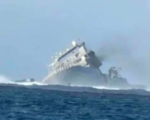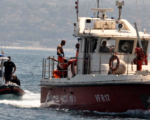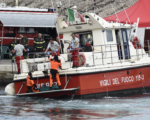Russian Man Rescued Alive After Nearly 10 Weeks Adrift in Sea Off Siberian Coast

A Russian man, Mikhail Pichugin, was rescued after 67 days adrift on the Sea of Okhotsk, a remote and frigid body of water off Siberia’s eastern coast. The harrowing ordeal, which began on August 9, tragically claimed the lives of his brother and 15-year-old nephew, according to Russian state media RIA Novosti.
Stranded at Sea for Over Two Months
Pichugin, 46, was found alive aboard a small, catamaran-type vessel with an orange lifejacket and a red flag raised on a pole. His rescue took place on October 14 when a passing fishing boat discovered the stranded vessel near the Ust-Khayryuzovo settlement in the Kamchatka region. Emergency responders worked to reach Pichugin, whose ordeal had taken him and his two companions on a treacherous journey across one of the coldest seas in East Asia.
The trio’s journey began on August 9 when Pichugin, his brother, and his nephew set sail on the catamaran. Soon after, contact with them was lost, leaving their location a mystery. With no updates on their whereabouts, authorities began a search, though their exact circumstances remained unknown until the fishing boat came across the vessel.
Survival Amid Harsh Conditions
The Sea of Okhotsk is known for its severe conditions, often freezing over between October and March. It is one of the coldest seas in East Asia, making survival in such an environment a near-impossible feat. Russian prosecutors are investigating potential water traffic safety violations, exploring whether negligence may have contributed to the deaths of Pichugin’s brother and nephew.
Elena Krasnoyarova, a spokesperson for Russia’s far eastern transport prosecutor’s office, explained that the authorities are working to establish the details surrounding the incident, including how the three became stranded and how Pichugin managed to survive.
The Role of Weight and Provisions in Survival
Pichugin’s wife revealed to RIA that her husband’s physical condition—he weighed around 220 lbs (100 kg)—may have played a crucial role in his survival. This theory suggests that his body may have been better equipped to endure the extreme conditions. Pichugin and his companions had packed enough food to last approximately two weeks, though it remains unclear how he managed to stretch those supplies over the nearly ten-week period he spent adrift.
Upon his rescue, Pichugin was described as being in “serious condition, emaciated, but conscious,” according to the director of the fishing company that found him. He was immediately taken to a hospital in Magadan, a town in Russia’s far east, for medical treatment.
Investigation Underway
Russian authorities are conducting an investigation into potential safety violations related to the incident, focusing on whether negligence played a role in the tragic loss of two lives. As the story unfolds, the investigation seeks to provide answers regarding how the trio ended up stranded and what led to the deaths of Pichugin’s brother and nephew.
Despite the tragic circumstances, Pichugin’s survival after nearly 10 weeks at sea has captured the attention of many, highlighting both the perilous nature of maritime travel in remote regions and the resilience of the human spirit.
















